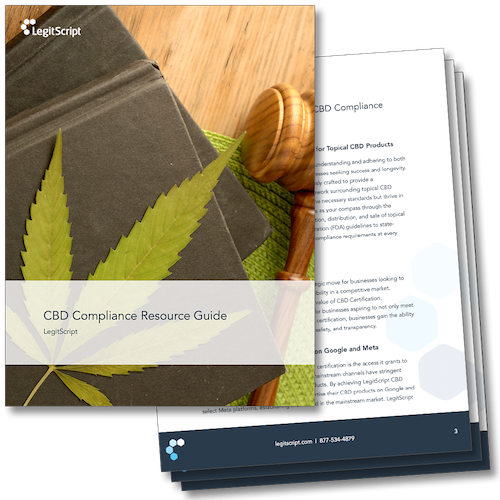From CBD product labels that claim to diagnose, cure, mitigate, treat, or prevent disease to truth-in-advertising requirements — LegitScript explores the regulatory environment of CBD as it exists today. Then download our CBD Compliance Resource Guide or create an account to apply for your CBD Certification.
What Is a Claim? And How It Relates to CBD Regulations Surrounding Product Labeling
A claim refers to any statement pertaining to the effects or results of using a product. As per the US Food and Drug Administration (FDA), a drug is defined as an article intended for use in diagnosing, curing, mitigating, treating, or preventing diseases in humans or animals, or is meant to affect body structure or function. Therefore, if a product is intended for any of these uses, it is considered a drug and must be FDA-approved. With limited exceptions, CBD products are not FDA-approved; therefore any disease or structure/function claims pertaining to these products is misleading.
Alongside the FDA, the Federal Trade Commission (FTC) plays a crucial role in regulating these claims and enforces truth-in-advertising requirements. It is illegal to claim that a product can prevent, treat, or cure human diseases without scientific evidence. Examples of misleading claims include stating that a product can help with diseases such as cancer or depression, affect body function or structure, or aid in weight loss.
Violation of these regulations can result in warnings or disciplinary actions from the FDA and FTC. Thus, compliance with federal and state regulations is vital to avoid deceptive practices that might defraud customers, regulators, or the public. State-level regulations may also apply, as seen in states like Utah and West Virginia, which have specific rules about product labels and advertising. Compliance is therefore critical for maintaining customer trust and mitigating legal and regulatory risks.
CBD Product Labeling Regulations and Compliance
In addition to claims about health benefits, product labeling is also a crucial aspect of compliance in the CBD industry. The FDA has strict rules on how CBD products should be labeled, and failure to comply can result in penalties or warning letters. This includes accurately listing ingredients, proper dosage information, and clear disclaimers about the potential risks and side effects of using CBD.
Download LegitScript’s CBD Compliance Resource Guide for a Comprehensive Breakdown
Are you a CBD manufacturer or retailer curious about how to remain compliant with product labeling regulations? Download LegitScript’s CBD Compliance Resource Guide for a comprehensive and detailed breakdown of how to maintain compliance with regulatory bodies across jurisdictions.
LegitScript’s CBD Certification Ensures Your Compliance With CBD Labeling Requirements
It's essential for businesses operating within the CBD industry today to stay informed about the laws impacting them to ensure they remain compliant. LegitScript’s CBD Certification supports businesses in maintaining continued compliance through active monitoring — and unlocks advertising on Google and select Meta platforms. Continued compliance with all regulatory requirements is essential for CBD businesses to build trust with consumers, establish credibility, and maintain long-term success in the market.
Create an account to start the application process today.





